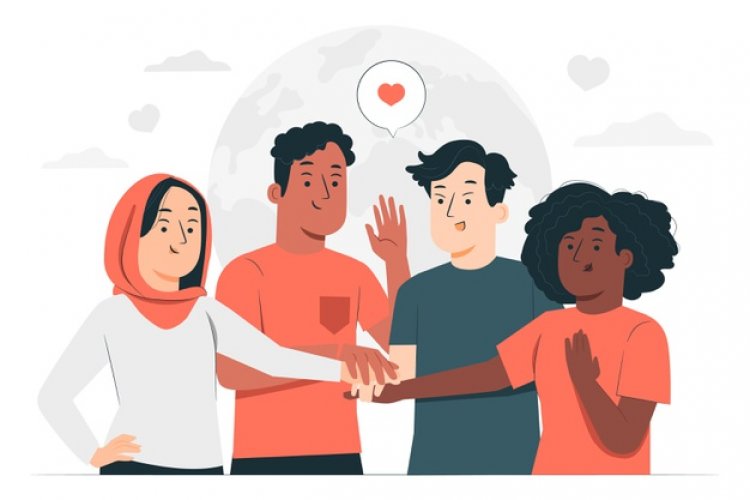Why Are Friendships So Beneficial to Our Health and Well-Being?
Positive relationships, like healthy diet and exercise, should be considered an essential investment in your health. Spending time with friends is not only enjoyable, but it also has a number of long-term physical and emotional health advantages.
Kelli Harding, MD, an assistant clinical professor of psychiatry at Columbia University Irving Medical Centre in New York City, says, "As a medical practitioner, I wish I could prescribe friendships for everyone."
But, before we get into all of the ways that a strong social network can help you feel better, it's vital to note that not all relationships are created equal. You can make unhealthy choices when it comes to your friendships and relationships, just as you can make bad decisions when it comes to your food and exercise.
Friendship is a two-way street in a healthy relationship. “If we're simply thinking about our own wants and not about our friends' needs, then the relationship is certainly unhealthy,” says Marisa Franco, PhD, a Washington, DC-based psychologist who specializes in friendship and relationships.
A good friend is always there for you, not just when it's convenient for them. “Showing up in times of need is extremely crucial in friendships,” Dr. Franco adds, adding that if a friend phones at midnight with a crisis, a true friend will not refuse to help. “I have to wake up if you're in a crisis,” she explains. “Unless I'm in a crisis myself, I'll turn up.”
It's also crucial to recognize that not everyone's social support system is the same. According to Dr. Harding, your network could include a partner, family members, friends, coworkers, teachers, or neighbors. “Anyone in your life who provides positive social support,” she says, reaps the benefits. Every sort of positive social support is advantageous, according to Harding, whether it looks like a spouse and a lot of strong family links, or if it's packed with individuals who aren't biologically connected to you.
How a Strong Social Network Can Help You Stay Healthy Physically and Emotionally
So, what does research say about why strong social bonds are beneficial to one's health and happiness? Here's what we've learned so far:
- Friendships help people feel like they belong
According to Mahzad Hojjat, PhD, a professor of psychology at the University of Massachusetts in Dartmouth (who has led studies on friendships, the benefits of close relationships, and marriage), simply feeling included — like you belong to a certain group — is helpful. According to a study published in Psychiatry in 2015, a sense of belonging satisfies a crucial emotional health need and helps reduce emotions of despair and hopelessness.
- Friends Can Assist in Increasing Self-Esteem
Friends can help you gain self-esteem and confidence. Your cheerleader is a terrific friend. “You want friends who are thrilled for you to share in your success,” Dr. Hojjat explains.
According to a study published in PLOS One in May 2015, belonging to a social group is associated with higher self-esteem because people take pride in and get significance from their interactions.
- Strong social ties can help you cope with life's stresses
Hojjat says, “Friendships go a long way in helping us buffer stress.” “Friends can assist us when we are going through difficult times in our lives.” She claims that telling a friend about a terrible day will help reduce some of your own tension.
Physical contact can also make a difference. Receiving a hug eased negative emotions including tension, according to a study published in PLOS One in October 2018. Harding argues that “positive and welcome physical touch is great for connection and health.” Of course, the pandemic has complicated matters. “Skin hunger, or contact deprivation, is a real thing,” Harding explains, emphasizing the importance of increasing emotional intimacy during the pandemic.
- Friendships may be beneficial to one's cognitive health
According to research involving senior women, having a wide social network protects cognition and lowers the incidence of dementia, albeit further research is needed to determine why.
- Friends Assist Us in Coping with All Types of Grief
Consider the last time you faced a difficult scenario, such as a family death or the loss of anything else significant to you (like a job, a pet, or a relationship). It's likely that having people to lean on helped you get through. Harding claims that lonely people have a harder time rebounding from life's setbacks.
A short study published in the Iranian Journal of Nursing and Midwifery Research in July-August 2015 discovered that moms who had a stillbirth relied on social support to avoid loneliness. “Having people in our lives and social support is perhaps the most important factor in helping individuals get through difficult times,” Franco says.
- Healthy Habits Can Be Encouraged by Friends
Positive interactions with others who make healthy choices might inspire you to do the same, according to Hojjat. “You might be attracted into physical exercise if your friends are.”
If they are concerned about you, they can also speak up. Friends are the ones that notice whether you're drinking too much or gaining too much weight since they see you and engage with you every day, according to Hojjat.
Experts believe that relationships have this influence on physical health because of the body's stress response, according to Keck Medicine at the University of Southern California in Los Angeles. Isolation and loneliness can lead to chronic stress, which can have a detrimental influence on your health, but keeping great friendships can help you stay healthy.
- Maintaining social connections may reduce the risk of long-term health issues
Franco says, "Our capacity to have social connection is very important to our ability to have a good life."
Social isolation and loneliness may be connected to inflammation, according to a review published in Neuroscience & Biobehavioural Reviews in May 2020. According to Harvard Health Publishing, high levels of inflammation can be hazardous and contribute to heart disease, arthritis, stroke, and Alzheimer's disease.
According to the Mayo Clinic, having strong social bonds has also been related to a lower chance of depression, as well as improved blood pressure and body mass indexes.
- Relationships that are strong may help us live longer
Participants with strong social interactions had a 50% higher chance of survival, according to a study published in PLOS Medicine.
Harding said of the study, "The difference in mortality risk didn't come down to age, gender, or even physical difficulties, but positive social connections with others." “Those with the highest levels of social integration — as measured by marital status, number of friends, and interaction with friends — had the best health outcomes.”
- Friendships that are healthy tend to make us happier
A study published in PLOS One in June 2019 discovered that having a strong social circle (as evaluated by study participants' mobile phone use) was a better predictor of happiness and general wellness than fitness tracker data like heart rate and physical activity.
It is beneficial to associate with joyful individuals, particularly if they live nearby. According to a study involving over 4,000 participants, having a cheerful friend who lives within a mile of you enhances your chances of being happy by 25%.

























